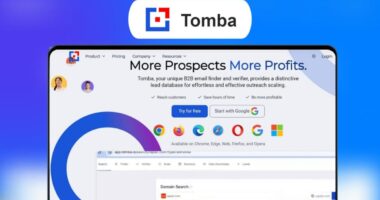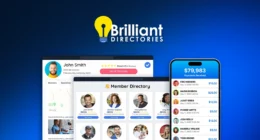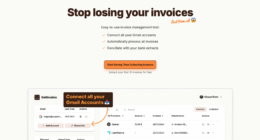Modern billing software streamlines financial operations for small businesses through automated invoicing and payment processing. Popular options like QuickBooks Online, Zoho Invoice, and FreshBooks offer customizable templates, secure payment gateways, and cloud-based accessibility. These solutions reduce administrative time by up to 50% while maintaining accurate financial records for tax compliance. With features like real-time tracking and multi-currency support, the right billing software can transform how small businesses handle their finances.
Quick Overview
- QuickBooks Online offers comprehensive billing features with accounting integration, making it ideal for small businesses needing all-in-one financial management.
- Wave provides free invoicing and accounting software perfect for budget-conscious small businesses starting their financial automation journey.
- Zoho Invoice delivers cost-effective billing solutions with customizable templates and automated payment processing for growing businesses.
- FreshBooks specializes in user-friendly billing features specifically designed for service-based small businesses and freelancers.
- Cloud-based billing software reduces administrative time by 50% while ensuring secure data backup and accessibility from anywhere.
Understanding the Role of Billing Software in Modern Business

As businesses continue to evolve in the digital age, billing software has become an essential tool for streamlining financial operations and maintaining competitive advantage. This technology transforms how small businesses handle their financial transactions, offering automated solutions that reduce errors and increase efficiency. Popular solutions like cloud-based tools help businesses efficiently track expenses and automate administrative work.
Modern billing software serves multiple vital functions in today's business environment. It automates invoicing and payment collection while maintaining accurate financial records for tax compliance. The software also enhances financial reporting capabilities, providing valuable insights for better decision-making. Integration with CRM tools like HubSpot and Salesforce ensures seamless data management across business platforms.
Essential Features to Look for in Small Business Billing Solutions
Selecting the right billing software requires careful consideration of several essential features that can greatly impact a small business's financial operations. The most significant elements include customizable invoice templates, automated payment processing, and robust security measures.
Choosing effective billing software is crucial for businesses, with customizable invoicing, automated payments, and security being paramount to financial success.
Modern billing solutions should offer these key capabilities:
- Automated invoice generation with recurring billing options
- Multiple payment gateway integrations for flexible payment collection
- Built-in payment reminders and tracking systems
- Cloud-based accessibility with real-time updates
- Integration with accounting software and third-party systems
QuickBooks integration provides comprehensive expense tracking and cash flow management tools that streamline accounting workflows. Additionally, the software should provide thorough reporting tools and data analytics to help business owners make informed decisions. Small business owners can focus more on business growth rather than spending time on manual administrative tasks.
Scalability is also important, ensuring the system can grow alongside the business while maintaining security compliance and protecting sensitive customer information.
Top Billing Software Options for Small Business Owners

Small business owners face an expanding marketplace of billing software options, each offering unique features to streamline financial operations.
Among the top contenders, QuickBooks Online stands out with its all-encompassing accounting solutions and extensive third-party integrations.
Zoho Invoice provides a cost-effective alternative with its free plan, offering features like recurring invoices and multilingual capabilities. For businesses seeking Microsoft integration, Dynamics 365 Finance delivers advanced financial planning and seamless connectivity with Microsoft 365 tools.
For budget-conscious businesses, Wave delivers free invoicing and accounting features, while FreshBooks caters to service-based companies with its user-friendly interface and time-tracking tools. The software includes automated payment reminders to help businesses get paid faster.
Invoice2go excels in mobile invoicing with customizable templates.
Each solution offers distinct advantages:
- QuickBooks Online: Complete financial management
- Zoho Invoice: Free plan with robust features
- Wave: No-cost accounting tools
- FreshBooks: Service business focus
- Invoice2go: Mobile-first approach
Maximizing Business Efficiency Through Digital Billing Tools
Digital billing tools revolutionize how small businesses manage their financial operations, offering all-encompassing solutions that streamline invoicing, payments, and accounting processes.
These systems automate routine tasks, reducing administrative time by up to 50% while minimizing human errors in financial transactions.
Cloud-based platforms ensure that billing data remains securely backed up and accessible from anywhere, providing peace of mind for business continuity.
By implementing digital billing solutions, businesses gain access to real-time financial insights, customizable invoicing options, and efficient tax management features.
Digital billing solutions empower businesses with instant financial data, flexible invoicing, and streamlined tax handling for smarter financial decision-making.
Leading platforms like Zoho Books offer user-friendly interfaces that make financial management accessible for businesses of all sizes.
The software's ability to integrate with existing accounting systems creates a seamless workflow, while automated payment reminders help maintain steady cash flow.
Additionally, these tools support business growth through multi-currency capabilities and scalable solutions that adapt to expanding operations.
For small business owners focused on efficiency, digital billing tools provide the foundation for improved financial management, enhanced customer experience, and sustainable growth.
Security and Integration Capabilities in Billing Software Systems

Modern billing software must prioritize robust security measures alongside seamless integration capabilities to protect sensitive financial data.
Today's systems incorporate multiple layers of protection, including end-to-end encryption, multi-factor authentication, and secure payment gateways that comply with industry standards like PCI-DSS.
These security features work in tandem with integration capabilities that allow businesses to connect their billing systems with existing software and security tools. Leading solutions offer AI-powered Scam Copilot technology to detect potential financial fraud attempts in business communications.
Real-time processing capabilities ensure immediate verification of transactions while maintaining security protocols.
Key protections include:
- Real-time fraud monitoring
- AI-powered threat detection
- Regular automatic backups
- Secure data storage solutions
- Email threat protection
Small businesses benefit from scalable solutions that grow with their needs while maintaining strong security protocols.
Regular updates and user training resources guarantee that staff can effectively utilize security features while staying informed about potential threats.
Frequently Asked Questions
How Long Does It Take to Train Employees on New Billing Software?
Training employees on new billing software typically takes 2-5 days for basic proficiency, though this varies based on software complexity and employee experience.
The initial training period includes demonstrations, hands-on practice, and basic troubleshooting. Employees usually need 2-3 weeks to become fully comfortable with the system.
Advanced features may require additional training sessions. Follow-up support and refresher courses are recommended throughout the first three months of implementation.
Can Billing Software Handle Multiple Currencies and International Tax Regulations?
Modern billing software effectively handles multiple currencies and international tax regulations.
Most platforms offer extensive features including real-time exchange rates, support for 125+ currencies, and automated compliance with country-specific tax rules.
Software like Xero, QuickBooks, and Sage Accounting provide tools for currency conversion, foreign currency gain/loss calculations, and customizable international tax reports.
These systems also integrate with global payment methods and automatically update exchange rates to guarantee accuracy.
What Happens to Billing Data if the Internet Connection Fails?
While modern billing systems offer sophisticated data protection, internet failures can still pose risks to billing data.
Most quality software employs automatic local caching, storing transactions temporarily on the device until connectivity resumes. Cloud-based systems typically maintain redundant backups across multiple servers.
However, during an outage, new transactions may be temporarily inaccessible. Regular data synchronization and offline mode capabilities help protect against data loss when internet connections fail.
Is It Possible to Switch Billing Software Providers Without Losing Historical Data?
Yes, switching billing software providers while preserving historical data is entirely possible through careful data migration.
Most modern billing systems offer specialized migration tools and API integrations that facilitate secure data transfer.
The key is proper planning and using the right migration approach, such as parallel running of systems during changeover.
However, it's essential to verify data compatibility between systems and perform thorough testing before completing the switch.
How Often Should Billing Software Be Updated to Maintain Optimal Performance?
Billing software should follow a multi-tiered update schedule for ideal performance.
Critical security patches should be installed monthly, while feature updates can be implemented quarterly. Emergency fixes require immediate attention.
Most providers offer automatic updates, which should be enabled during off-peak hours.
Additionally, businesses should perform system checks bi-weekly to verify all components are current and functioning correctly.
This structured approach maintains security and efficiency while minimizing disruption.
Conclusion
The digital transformation of small business billing continues to evolve rapidly, making it essential for owners to stay informed about their software options. While the perfect solution varies for each business, implementing the right billing system can dramatically improve efficiency, cash flow, and customer satisfaction. As technology advances, companies that embrace modern billing tools position themselves for sustainable growth in an increasingly competitive marketplace.








